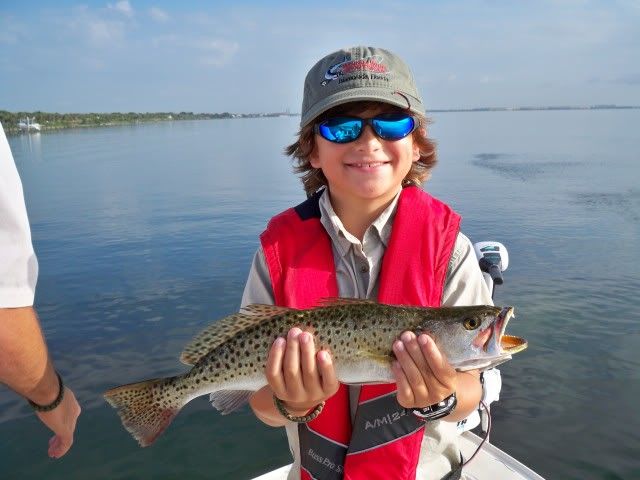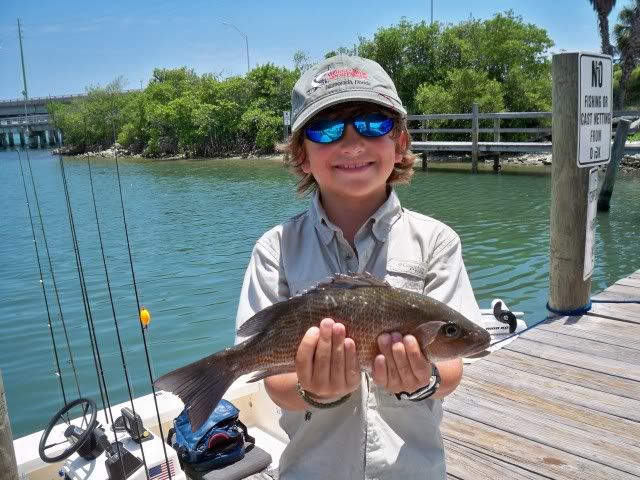INSHORE REPORT:
It might have been another hot week out there, but the conditions ended up being ideal for the many lobster hunters during the mini-season this year. I took the middle of the week off to avoid the extra boat traffic and also to build a new swing set for the grandkids. It certainly is fun to spoil grandchildren!! We had a trip earlier in the week with Jason and Veronica to celebrate Noah's 10th birthday on the water.
Noah out fished everyone while catching trout, snapper and assorted other fish around the river. You find out quick that Noah is a very avid fisherman. He even hooked up on a big snook that wasn't about to be landed that day. Happy Birthday Noah! The early morning bite has been the best for us. Once the sun heats up the flats, you must move to deeper water to find any fish to catch. The trout have been feeding on glass minnows like crazy lately. If you look at the photo of Noah and one of his trout very close, you can spot the schools of glass minnows on top of the water behind him. Fish the edges of these bait pods and you can find hungry trout out there. Live bait and CAL jerk baits have continued to find trout for us. Have fun, but get out early!
The snook bite has remained good around the jetties of both inlets. Live bait, DOA TerrorEyz or diving plugs have all worked well when the snook are feeding. There are some nice snapper around the river. Try around structure or along channel edges. You can even find them feeding on the glass minnows. Look for whiting along the beach and you should find some tarpon out off the surf if the bait is around.
Tip of the Week:
Hydration is vital this time of year with the heat index over 100+ degrees every day. Drinking lots of fluids can help prevent dehydration. Lots of water, Gatorade or Powerade while out in the sun is just as important as not forgetting that favorite rod & reel or lucky hat. I post the information that the Red Cross supplies at least once a year. Below is some of their safety tips for being out in the heat. Visit www.redcross.org for more information.
Red Cross Heat Safety Tips:
Dress for the heat. Wear lightweight, light-colored clothing. Light colors will reflect away some of the sun's energy. It is also a good idea to wear hats or to use an umbrella.
Drink water. Carry water or juice with you and drink continuously even if you do not feel thirsty. Avoid alcohol and caffeine, which dehydrate the body. Avoid using salt tablets unless directed to do so by a physician.
Eat small meals and eat more often. Avoid high-protein foods, which increase metabolic heat.
Slow down. Avoid strenuous activity. If you must do strenuous activity, do it during the coolest part of the day, which is usually in the morning between 4 and 7 a.m.
Stay indoors when possible. If air-conditioning is not available, stay on the lowest floor out of the sunshine. Remember that electric fans do not cool, they simply circulate the air.
Be a good neighbor. During heat waves, check in on elderly residents in your neighborhood and those who do not have air conditioning.
Learn Red Cross first aid and CPR.
Know What These Heat-Related Terms Mean:
Heat cramps: Heat cramps are muscular pains and spasms due to heavy exertion. Although heat cramps are the least severe, they are an early signal that the body is having trouble with the heat.
Heat exhaustion: Heat exhaustion typically occurs when people exercise heavily or work in a hot, humid place where body fluids are lost through heavy sweating. Blood flow to the skin increases, causing blood flow to decrease to the vital organs. This results in a form of mild shock. If not treated, the victim may suffer heat stroke. Signals of heat exhaustion include cool, moist, pale flushed or red skin; heavy sweating; headache; nausea or vomiting; dizziness; and exhaustion. Body temperature will be near normal.
Heat stroke: Also known as sunstroke, heat stroke is life-threatening. The victim's temperature control system, which produces sweating to cool the body, stops working. The body temperature can rise so high that brain damage and death may result if the body is not cooled quickly. Signals include hot, red and dry skin; changes in consciousness; rapid, weak pulse; and rapid, shallow breathing. Body temperature can be very high—sometimes as high as 105 degrees.
General Care for Heat Emergencies:
Heat cramps or heat exhaustion: Get the person to a cooler place and have him or her rest in a comfortable position. If the person is fully awake and alert, give half a glass of cool water every 15 minutes. Do not let him or her drink too quickly. Do not give liquids that contain alcohol or caffeine. Remove or loosen tight clothing and apply cool, wet cloths, such as towels or sheets. Call 9-1-1 or the local emergency number if the person refuses water, vomits or loses consciousness.
Heat stroke: Heat stroke is a life-threatening situation! Help is needed fast. Call 9-1-1 or your local emergency number. Move the person to a cooler place. Quickly cool the body. Immerse victim in a cool bath, or wrap wet sheets around the body and fan it. Watch for signals of breathing problems. Keep the person lying down and continue to cool the body any way you can. If the victim refuses water or is vomiting or there are changes in the level of consciousness, do not give anything to eat or drink.
Remember, fishing is not just another hobby....it's an ADVENTURE!
Good Fishing and Be Safe!
Captain Charlie Conner
http://www.fishtalescharter.com
captaincharlie@fishtalescharter.com
772-284-3852
Noah celebrating his tenth birthday with a few catches on the water. Notice the glass minnow schools behind him in his trout picture.


